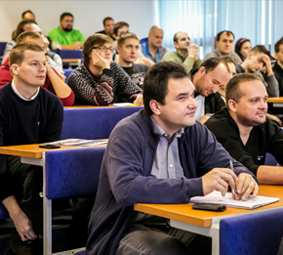Projects
|
Project name |
Project description |
|---|---|
| Enhancing cognition and motor rehabilitation using mixed reality |
Technological advancements based on mixed reality (MR) offer various challenges for research and medical treatment. The project focuses on two objectives related to healthy subjects and hemiparetic patients after stroke. First, we will test the hypothesis whether cognitive training using appropriately designed MR environment will enhance perceptual and cognitive performance in healthy subjects. This will be tested by computerized psychological experiments as well as by measuring event-related potentials or ERPs. Second, we will test the hypothesis whether experience with training in MR (in combination with motor-imagery based brain-computer interface developed by us) will enhance oscillatory sensory-motor rhythms. This will be tested by measuring subject’s EEG activity before and after each training session, clinical testing, as well as by the questionnaires aiming to learn about human factors including mental fatigue, motivation, irritation or sleepiness due to training. In both objectives, we will design and implement a set of testing procedures, carry out a battery of dedicated experiments, and critically evaluate the results with the goal to validate MR designs. |
| Computer-Aided Decision Support System for Hepatic Encephalopathy |
The goal of this project is to provide deep speech and handwriting analysis and investigate whether speech and handwriting can be used for diagnosis and monitoring of hepatic encephalopathy and whether there exists relationship between speech, handwriting and other biomarkers in hepatic encephalopathy. The number of novel signal processing algorithms, which reveal alteration in handwriting and speech more accurately than existing approaches, are proposed, giving rise to new group of features. The robust feature selection algorithms select the optimal subset of these features, which are fed into non-parametric regression and classification algorithms, mapping the signal processing algorithm outputs to stage of hepatic encephalopathy. Even though proposed project is focused on particular disease, we expect that some of the outputs, such as new features will be applicable also for other diseases. |
| CEEPUS - Central European Exchange Program for University Studies |
CIII-HU-0019-13-1718, CIII-HU-0019-12-1617, CIII-HU-0019-11-1516, CIII-HU-0019-10-1415, CIII-HU-0019-09-1314 International Cooperation in Computer Science |
| BIP4 - Balík inovatívnych prvkov pre reformu vzdelávania na TUKE |
Balík doplnkov pre ďalšiu reformu vzdelávania na TUKE, ITMS:26110230093 |
| BIP3 - Balík zlepšení kvality TUKE prostredníctvom sietí |
http://www.tuke.sk/tuke/strukturalne-fondy-eu/vyzva-1-2-vysoke-skoly-a-v... |
| BIP2 – Balík inovatívnych prvkov pre reformu vzdelávania na TUKE |
Balík prvkov pre skvalitnenie a inováciu vzdelávania na TUKE, ITMS kód projektu:26110230070 |
| Analýza písma pre klinické počítačové systémy pre podporu rozhodovania |
|
| Agent based modeling of the spectrum distribution in the cognitive radio networks |
|
Pages
- « first
- ‹ previous
- 1
- 2
- 3
- 4



















